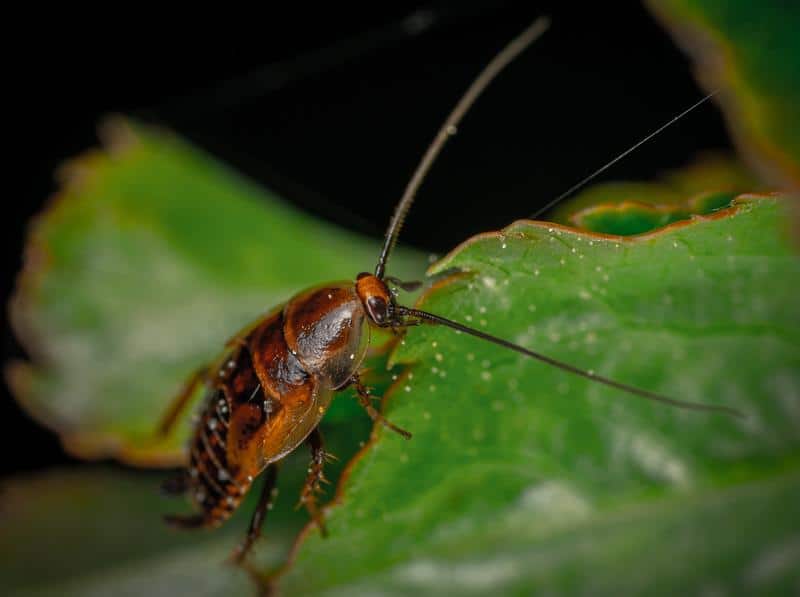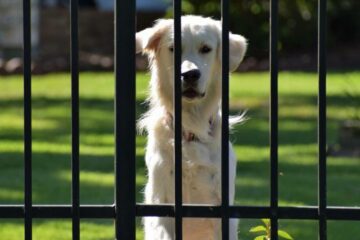Do Dogs Eat Roaches? Do Cockroaches Bite Dogs?
Do dogs eat roaches? Do cockroaches bite dogs? In this article, we’ll tell you everything you need to know about these questions. We’ll cover can dogs eat cockroaches, what to do if your dog eats a cockroach, why they do it, and the command you’ll need to stop the behavior for good.
Next, we’ll fill you in on do cockroaches bite dogs, what cockroach bites on dogs look like, and the proper treatment. To get rid of these bugs, you’re going to need to know not just the best methods, but also if dog pee attracts roaches, if roaches are attracted to dog poop, what to do if your dog ate roach poison, and the symptoms if they did. Keep reading!
Do Dogs Eat Roaches?

Dogs do eat roaches in some cases. This happens because dogs have a natural instinct to chase and catch fast-moving creatures like roaches, and in some cases, they may succeed and then eat them. While most dogs won’t get sick from eating a roach, you should prevent it due to potential health risks such as transmission of parasites or bacteria.
Can Dogs Eat Cockroaches?
Dogs can eat cockroaches, but it is not something that should be encouraged or allowed if it can be helped. Cockroaches are not inherently toxic or poisonous to dogs, but they are known carriers of a host of unsavory and potentially harmful parasites and bacteria, such as Salmonella.
Moreover, roaches often inhabit unsanitary places and could be covered in harmful substances. Thus, if a dog consumes a roach that has been in contact with any of these potential health hazards, it could lead to a variety of health problems.
These problems could range from simple and relatively harmless gastrointestinal upsets, such as vomiting or diarrhea, to more serious, even life-threatening infections.
What to Do if Dog Eats Cockroach?
If your dog eats a cockroach, the first step is to monitor them closely for any signs of illness. Symptoms that may signal a problem include vomiting, diarrhea, loss of appetite, lethargy, or any other behavioral changes that seem out of character for your pet.
If you observe any of these signs or if you’re feeling at all concerned, it’s always best to reach out to your vet. They can provide guidance on the next steps and potentially administer treatment if necessary. While most dogs that consume a roach will experience no ill effects, it’s always better to err on the side of caution when it comes to the health of your pet.
Why Does My Dog Eat Cockroaches?
Your dog eats cockroaches because many will find the bugs interesting and may be driven to chase, play with, or eat them due to their deep-rooted hunting instincts. Dogs are carnivores by nature, and their ancestors depended on hunting small, fast-moving creatures for sustenance.
This instinct still resides within our domestic dogs, and the sight of a cockroach skittering across the floor can definitely stimulate their predatory impulse, making it an enticing target.
Training “Leave It” Command
To prevent your dog eating cockroaches or other undesirable items, one of the best things you can do is train the “leave it” command. This command instructs your dog to immediately stop what they’re doing and shift their focus onto you. Here’s how to train this command:
- Start with a treat in both hands. Show your dog one enclosed fist with the treat inside and say, “leave it.”
- Ignore the behaviors your dog displays to get the treat, and once they stop trying, give them the treat from the other hand.
- Repeat until your dog moves away from the first fist when you say, “leave it.”
- Next, only give the treat when your dog looks up at you. This helps to ensure their focus shifts onto you.
- Move onto more challenging “leave it” scenarios like dropping a less appetizing treat on the floor.
These steps will get your dog to stop eating roaches, but it’s important to remember that the underlying behavioral issues (prey drive, curiosity, etc.) that were causing all of this to begin with will still be present. And until you address those, any positive changes you see are only going to be temporary.
“Well, how do I make these changes last?”
By getting your dog to truly choose to follow your direction, that’s how. I tried many times to write out how you can do that before deciding it made more sense to just link you to the free video series that explains it better than I’d ever be able to.
The series is by a man named Dan who is one of the world’s leading dog obedience trainers. In it, he teaches you how to put an end to things like your dog eating cockroaches and all other misbehavior using his fast and easy-to-follow methods.
In the first video, Dan will reveal to you why the two most common methods of dog training only doom you to failure. You can watch the video now by clicking here. Follow the proven system he’ll show you in his series and you’ll never have to spend another second worrying about your dog eating roaches ever again!
Do Cockroaches Bite Dogs?

Cockroaches do bite dogs, but it rarely actually happens. Cockroaches are omnivorous creatures that primarily feed on decaying matter and are more likely to scuttle away than confront or bite a dog. However, in extreme cases of infestation where their normal food sources are scarce, cockroaches might bite dogs.
Can Cockroaches Hurt Dogs?
While cockroaches can bite, the chances of them harming dogs are quite low. The main risk to dogs from cockroaches is not from bites, but from the potential for disease transmission. Cockroaches are known carriers of various bacteria and parasites, which can be harmful to dogs if ingested.
This is why it’s essential to prevent dogs from eating cockroaches. The bite itself, although rare, is usually not serious and may cause minor irritation, redness, or swelling.
Cockroach Bites on Dogs: What Do They Look Like?
Cockroach bite marks on dogs look small and might appear as a red bump, similar to a mosquito bite. These bumps may be slightly raised and cause irritation or itchiness. In some instances, the area around the bite may also appear red and swollen.
However, distinguishing a cockroach bite from bites of other insects or minor skin irritations can be challenging without a veterinary examination.
Cockroach Bite on Dog Treatment
If you suspect that a cockroach bit your dog, the first course of action should be to clean the area with warm water and mild soap. This can help prevent secondary infections caused by bacteria entering the wound. Keeping an eye on the affected area and monitoring your dog’s behavior for signs of discomfort is also crucial.
If the bitten area does not improve after a few days or worsens (increasing redness, swelling, pus, or your dog seems to be in pain), a visit to the veterinarian is necessary. The vet may prescribe a topical ointment or an oral medication to address any infection and reduce inflammation.
In the grand scheme of things, the most effective way to protect your dog from potential cockroach bites is to control and eliminate any cockroach infestation in your home. Regular cleaning, proper food storage, and professional pest control services can be a significant first line of defense.
Teaching your dog the “leave it” command is also very helpful at keeping them away from cockroaches and other bugs. Learn how to do it in the first section.
It’s a very good idea to get this issue taken care of now as it will also keep your dog safe during future interactions with other insects. You then won’t have to worry about things like fire ant bites on dogs, what to do if your dog ate ants, is a monarch butterfly poisonous to dogs, are woolly bear caterpillars poisonous to dogs, or if boxelder bugs are poisonous to dogs.
Does Dog Pee Attract Roaches?

Dog pee can potentially attract cockroaches, but it’s not the primary factor that attracts these pests. Roaches are attracted to various forms of organic matter, including pet food, leftover food, and even decaying organic materials. While they might be drawn to the scent of dog urine as it can signal the presence of food sources, it’s not the most likely attractant.
Are Roaches Attracted to Dog Urine?
Cockroaches have a highly developed sense of smell and are typically attracted to areas that provide food, water, and shelter. Dog urine can signal the presence of these resources, primarily if the urine is in an area where dog food or other food sources are readily available.
Therefore, while dog urine itself might not be the main attractant, it can be a part of the overall environment that makes your home attractive to roaches.
How to Prevent Cockroaches from Being Attracted to Your Home
Preventing a roach infestation in your home involves maintaining cleanliness and ensuring all potential food sources are securely stored or disposed of. Here are some key steps to consider:
- Clean up pet food: Roaches are far more attracted to pet food than dog urine. Ensure you don’t leave pet food out overnight and store it in sealed containers.
- Dispose of garbage regularly: Keep garbage cans sealed and take out the trash often. This practice reduces the likelihood of roaches finding a food source in your home.
- Regular cleaning: Clean your home regularly, especially the kitchen and bathroom. Crumbs and spills can attract roaches, so ensure these are cleaned up promptly.
- Seal entry points: Cockroaches can enter through small cracks and crevices. Regularly check for and seal any potential entry points in your home.
What to Do If You Have a Roach Infestation
If you find that you have a cockroach infestation, it’s best to contact a professional pest control service. Roaches can be hard to eradicate due to their resilient nature and rapid reproduction rates. A pest control professional will be able to assess the situation and suggest the best course of action. Also, they’ll provide you with advice on how to prevent future infestations.
You should also teach your dog the “leave it” command, which will train your dog to stay away from roaches and other insects. Learn how to do it in the first section.
Dog Ate Roach Poison

If your dog ate roach poison, it can potentially lead to severe health problems, depending on the type and amount of poison consumed. If you suspect your dog ate cockroach poison, contact your vet or poison control center immediately for guidance. Time is of the essence, and your pet’s swift treatment can make a significant difference in their prognosis.
Symptoms of Roach Poisoning in Dogs
If your dog ate roach poison, they may display certain symptoms, although these can vary based on the type of poison consumed. Common signs include vomiting, diarrhea, drooling, loss of appetite, lethargy, difficulty breathing, and, in severe cases, seizures or collapse.
If your dog is showing any of these symptoms, especially after possible contact with roach poison, seek veterinary help immediately.
Is Cockroach Spray Harmful to Dogs?
Cockroach sprays and other insecticides can be harmful to dogs if ingested or inhaled because they often contain dangerous chemicals. While brief contact with these sprays might not cause severe illness, prolonged exposure or ingestion can lead to symptoms like excessive drooling, vomiting, diarrhea, tremors, and, in severe cases, seizures.
What Happens if a Dog Eats Cockroach Poison?
If a dog eats cockroach poison, it can lead to a condition known as toxicosis. This is a poisoning that occurs due to the toxic chemicals in the roach poison. Depending on the specific type of poison consumed, your dog might experience a range of symptoms, from mild gastrointestinal upset to severe neurological problems.
It’s very important to get your dog to the vet immediately if you suspect they’ve ingested roach poison.
Will Cockroach Poison Kill My Dog?
Cockroach poison can kill a dog, but it depends on several factors, including the type and amount of poison consumed, the size and health of the dog, and how quickly treatment is provided. While some dogs may only experience mild symptoms, others could face severe health issues or even death, particularly if they eat a large amount of poison and don’t receive timely treatment.
Remember, if you suspect your dog has ingested any form of poison, seek veterinary assistance immediately. It’s always better to err on the side of caution when it comes to your pet’s health. Always store pesticides and other harmful substances safely out of your dog’s reach.
We’ll teach you how to keep your dog away from roach poison and other things they shouldn’t be around using the “leave it” command in the first section of this article.
Are Roaches Attracted to Dog Poop?

Roaches are attracted to dog poop. Roaches are omnivorous and will eat just about anything organic, and this includes dog feces. Leaving dog waste in your yard or home can definitely attract roaches, among other pests, making sanitation crucial for roach prevention.
- Roach Dietary Habits: Cockroaches are omnivorous scavengers, meaning they consume a wide variety of organic materials. They’re not particularly fussy eaters and are known to consume materials such as dead plants, food scraps, garbage, and yes, even animal waste, including dog poop.
- Attraction to Dog Poop: Roaches are drawn to dog poop due to its organic nature and the nutrients it provides. It’s a potential food source for them and, if left uncleaned, can definitely draw roaches to your home or yard.
- Risks: The presence of roaches poses a health risk for both humans and pets. They can spread bacteria and parasites which can lead to diseases. Also, roaches can trigger allergic reactions in some people and pets. This makes the removal of attractions, such as dog poop, important.
- Prevention: Maintaining cleanliness is key in preventing a roach infestation. Regularly clean up after your dog, properly seal food containers, and regularly take out the trash. Sealing potential entry points such as cracks and crevices can also prevent roaches from entering your home.
In conclusion, roaches are attracted to dog poop. This is why maintaining a clean environment, promptly cleaning up after your dog, and practicing good sanitation can significantly help in keeping roaches, and other pests, away from your home and yard. Learn to keep your dog away from roaches in the first section.
How to Get Rid of Cockroaches

To get rid of cockroaches, cleanliness is key. Regular cleaning, sealing off potential entry points, using cockroach baits and traps, and if necessary, hiring a professional pest control service, are effective ways to eliminate these pests.
- Regular Cleaning: Cleanliness is crucial in keeping roaches away. Regularly take out the trash, wipe down surfaces to remove crumbs and spills, and avoid leaving dishes in the sink overnight. Also, clean under appliances where crumbs may accumulate, and don’t forget to regularly clean up after your pets.
- Seal Off Entry Points: Cockroaches can squeeze through the smallest of gaps. Therefore, seal off potential entry points like cracks, crevices, and holes in walls, doors, windows, and especially areas where plumbing and electrical lines enter your home.
- Cockroach Baits and Traps: Using cockroach baits and traps can be an effective method to eliminate these pests. These products contain a slow-acting insecticide incorporated into a food attractant. Roaches feed on the bait, return to their hiding places and die. Other roaches eat them, causing a domino effect that can wipe out the entire infestation.
- Hire a Pest Control Service: If the infestation is large or the DIY methods aren’t effective, consider hiring a professional pest control service. They have the knowledge, tools, and experience to handle the situation more effectively.
In conclusion, getting rid of cockroaches involves a combination of maintaining a clean environment, sealing off their potential entry points, using pest control products, and possibly hiring a professional service. It’s important to take swift action at the first sign of an infestation, as roaches reproduce rapidly and their populations can grow out of control if left unchecked.
Learn to keep your dog away from these potentially harmful bugs by going back to the first section.
I’m sure you’re ready to quit worrying about cockroach problems, so I’ll let you get started now. Good luck with everything, and thanks for reading our article “Do Dogs Eat Roaches? Do Cockroaches Bite Dogs?”





